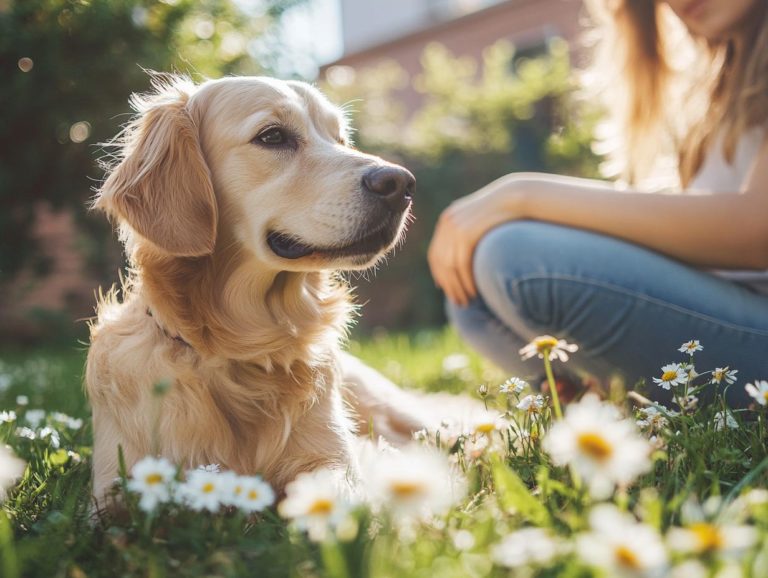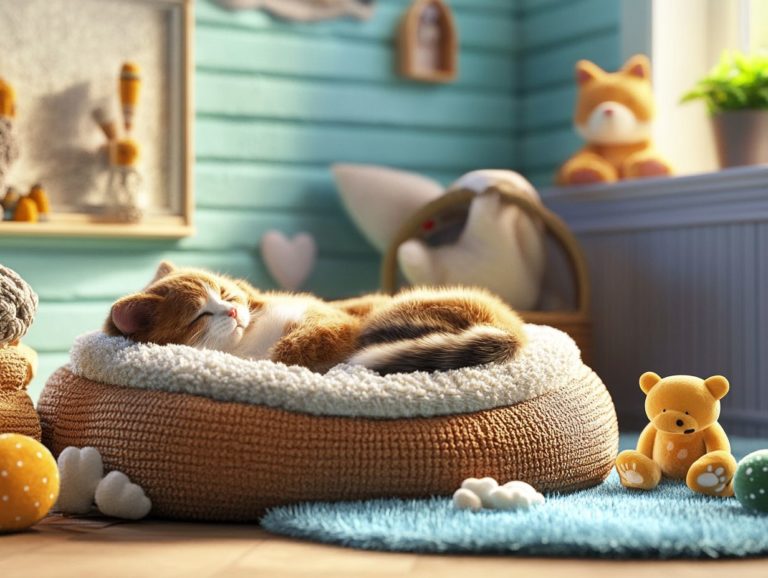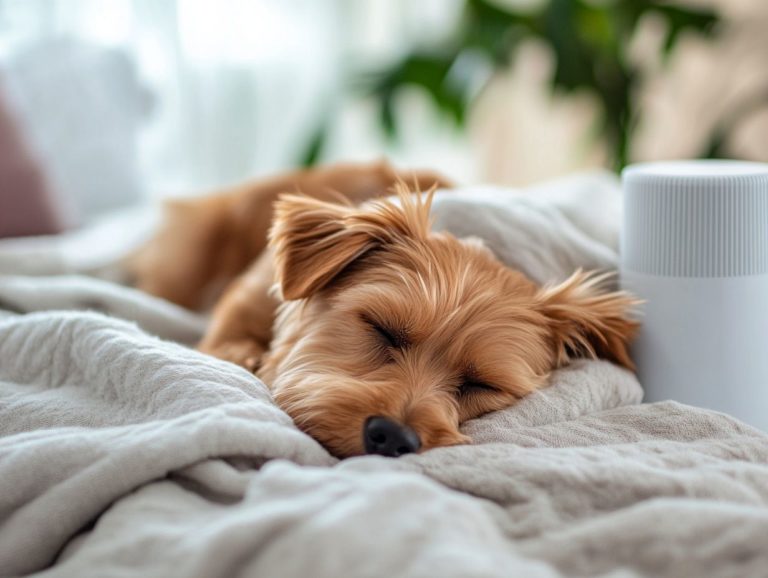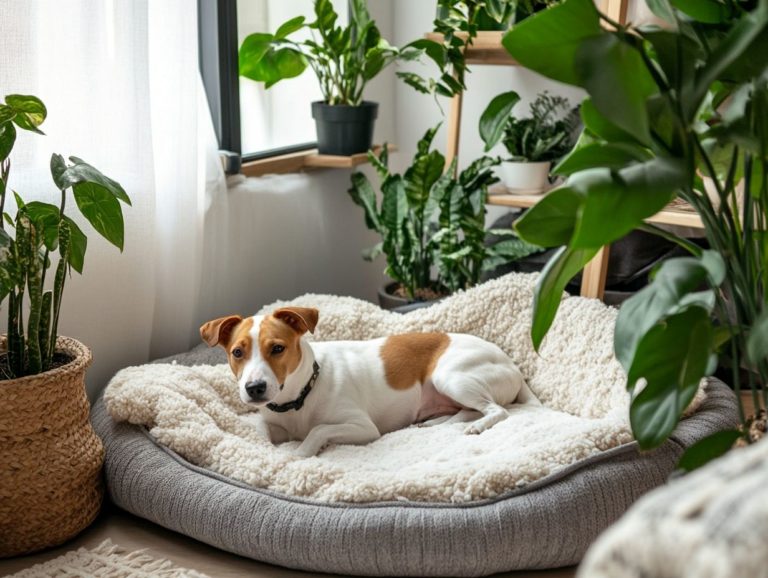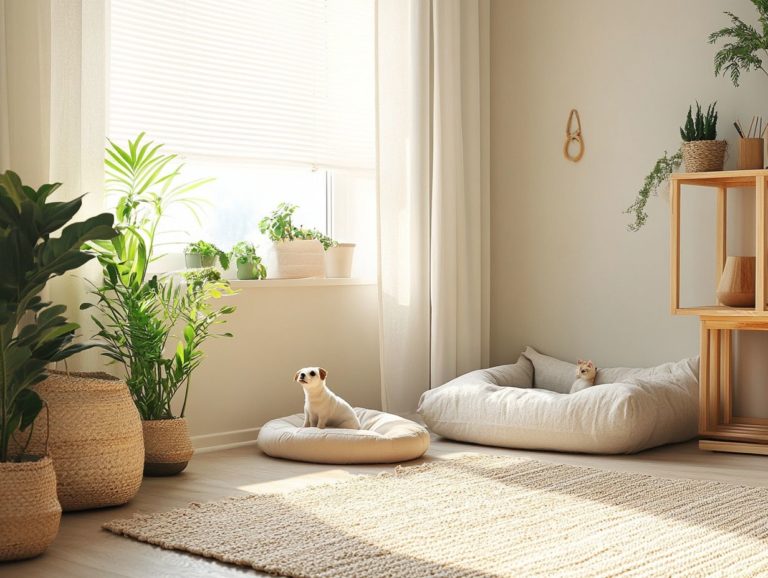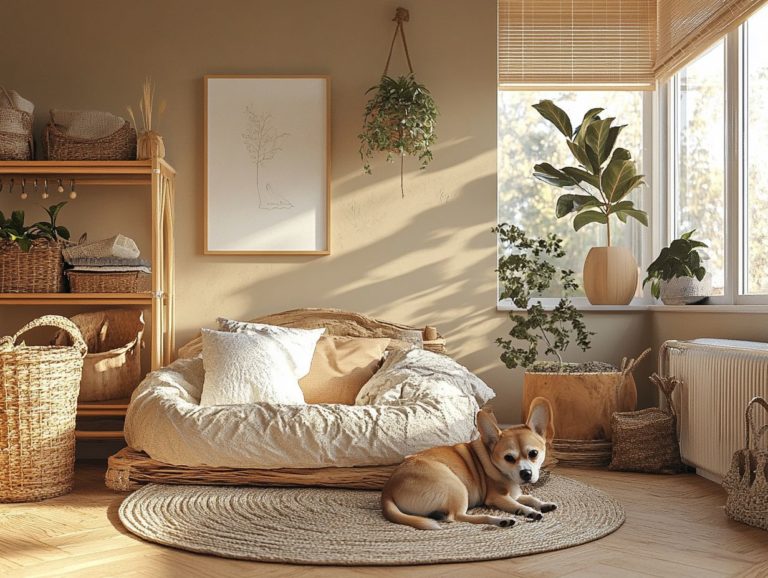Creating a Comfortable Space for Senior Pets
As your cherished pets grow older, their needs transform, prompting you to adapt their care and living environments for optimal comfort and well-being. This includes important adjustments to your home that enhance their quality of life.
This article delves into the distinct physical and behavioral changes that senior pets undergo. It offers insights on how to craft a nurturing living space that caters to their mobility issues and comfort requirements.
You will find discussions on essential nutrition, health management, and emotional support strategies designed to enhance their quality of life while also addressing better health concerns.
Let’s explore how to give your furry friends the best care during their golden years, with special consideration for incontinence and memory loss often seen in older dogs.
Contents
- Key Takeaways:
- Understanding the Needs of Senior Pets
- Designing a Comfortable Living Space
- Providing Proper Nutrition and Hydration
- Nutrition for Healthy Senior Pets
- Ensuring Adequate Hydration
- Managing Health and Medical Needs
- Emotional Support and Enrichment
- Frequently Asked Questions
- How can I create a comfortable space for my senior pet?
- What type of bedding is best for senior pets?
- How can I make my home more comfortable for my senior pet?
- What kind of toys are suitable for senior pets?
- Should I make any changes to my senior pet’s diet?
- What else can I do to ensure my senior pet is comfortable in their space?
Key Takeaways:
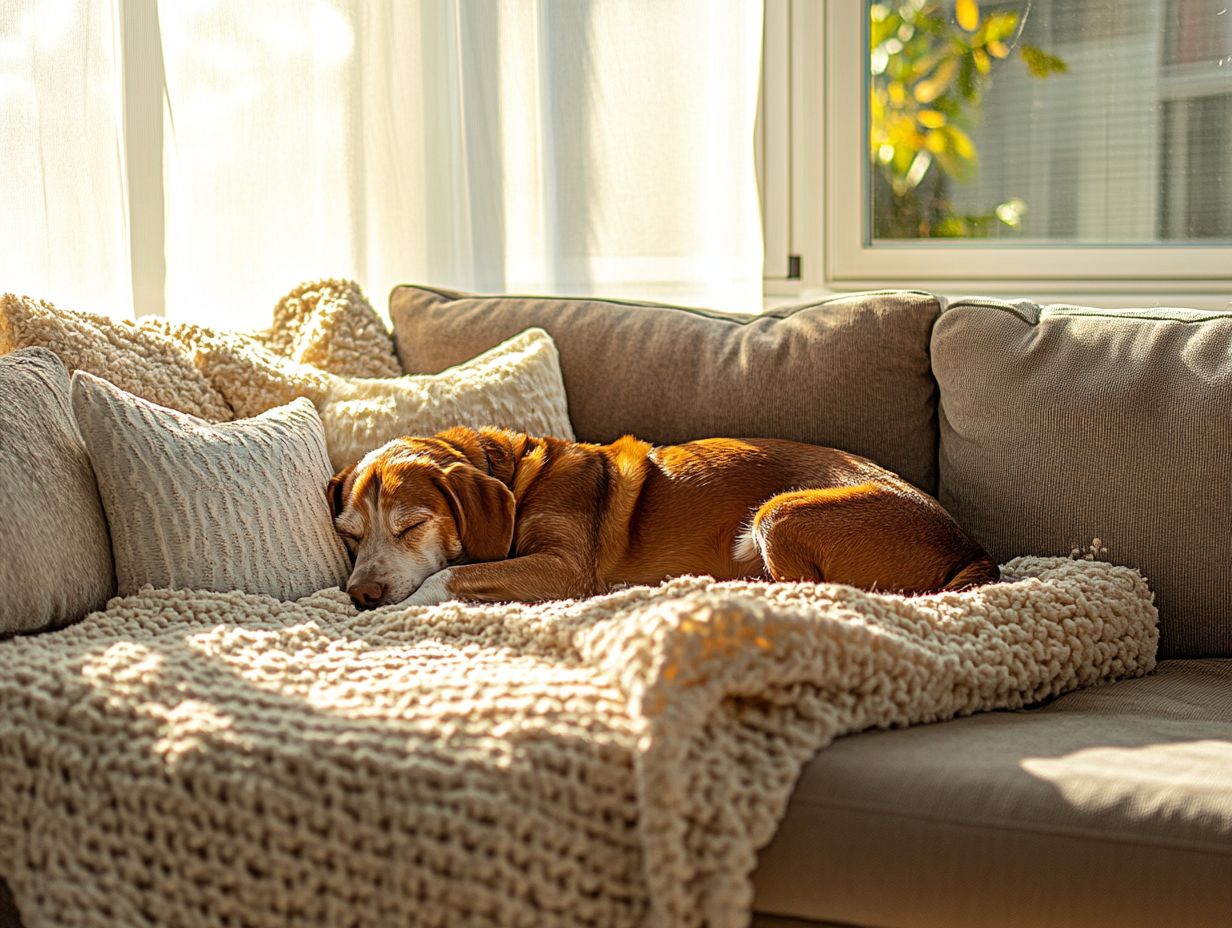
- Understand the physical and behavioral changes of senior pets to better cater to their needs.
- Design a living space that is adapted for their comfort and mobility, incorporating comfort adjustments and accessibility modifications.
- Ensure proper nutrition, hydration, and medical care to support the health and well-being of senior pets.
Understanding the Needs of Senior Pets
Understanding the needs of senior dogs is essential for their overall well-being, greatly impacting their quality of life and requiring various wellness tips to keep them safe.
As dogs age, they encounter a range of physical changes, such as mobility challenges and memory loss, which necessitate special care.
These changes may include vision impairment and heightened health concerns that need your careful attention.
By creating a comfortable environment, you can effectively address these challenges, ensuring that your beloved companions remain comfortable and joyful throughout their golden years. Additionally, using furniture to create safe zones for pets can enhance their comfort, along with tools like night lights and heating elements.
Physical and Behavioral Changes
Senior dogs undergo a range of physical and behavioral changes that can profoundly impact their daily lives. This includes mobility challenges and cognitive decline, sometimes resulting from conditions like canine cognitive dysfunction.
As your dog ages, you might notice them struggling with decreased mobility, often due to arthritis or other joint issues. This can make everyday activities, like climbing stairs or enjoying leisurely walks, quite challenging.
Consider installing ramps and dog stairs for easier access. This can lower their quality of life, as they might become less active and lose interest in play and social interactions. Incorporating mental enrichment activities can help keep them engaged.
You might notice behavioral changes like anxiety or confusion, which can be distressing for both your pet and you. These changes are often exacerbated by conditions like canine dementia.
To navigate these transitions more smoothly, think about making a few changes at home to create a more supportive environment:
- Provide joint supplements to support their mobility, and consider using dog shoes to protect sensitive paws during walks.
- Create a comfortable living space that caters to their needs, including pet accessories such as area rugs and cushions for added comfort.
- Incorporate simple training exercises that stimulate them mentally and emotionally while ensuring regular vet visits to monitor their progress.
These steps can help enhance their well-being and keep their spirits up.
Designing a Comfortable Living Space
Creating a comfortable living space for your senior dogs requires thoughtful adjustments to your home that prioritize their comfort and safety. Consider implementing creating an inviting space for rescue pets, which includes features like non-slip surfaces and baby gates to keep them secure.
Consider installing an orthopedic bed to support their joints. Additionally, you might want to look into creating a Zen corner for your anxious pet by modifying spaces to enhance accessibility with features like heating pads and monitoring for injury prevention to ensure that the environment is free from hazards.
By implementing these adjustments, you can significantly improve the overall well-being of your aging dogs. This will allow them to fully enjoy their surroundings while staying comfortable and secure.
Adapting for Mobility and Comfort
Making your home comfortable for senior dogs with mobility issues is crucial. Consider changes like orthopedic beds for restful sleep and elevated dog bowls to ease joint strain, or explore ways to create a harmonious home for anxious pets.
Installing ramps can help your dog move around easily. Dog ramps provide a gentle slope to access couches or cars without jumping.
There are many pet accessories that can boost their mobility. Training ramps and special shoes can improve grip and safety.
These thoughtful modifications create a nurturing environment. They help your senior dog stay active and engaged, and knowing how to arrange furniture for anxious pets is essential for their well-being.
Creating Safe and Accessible Areas
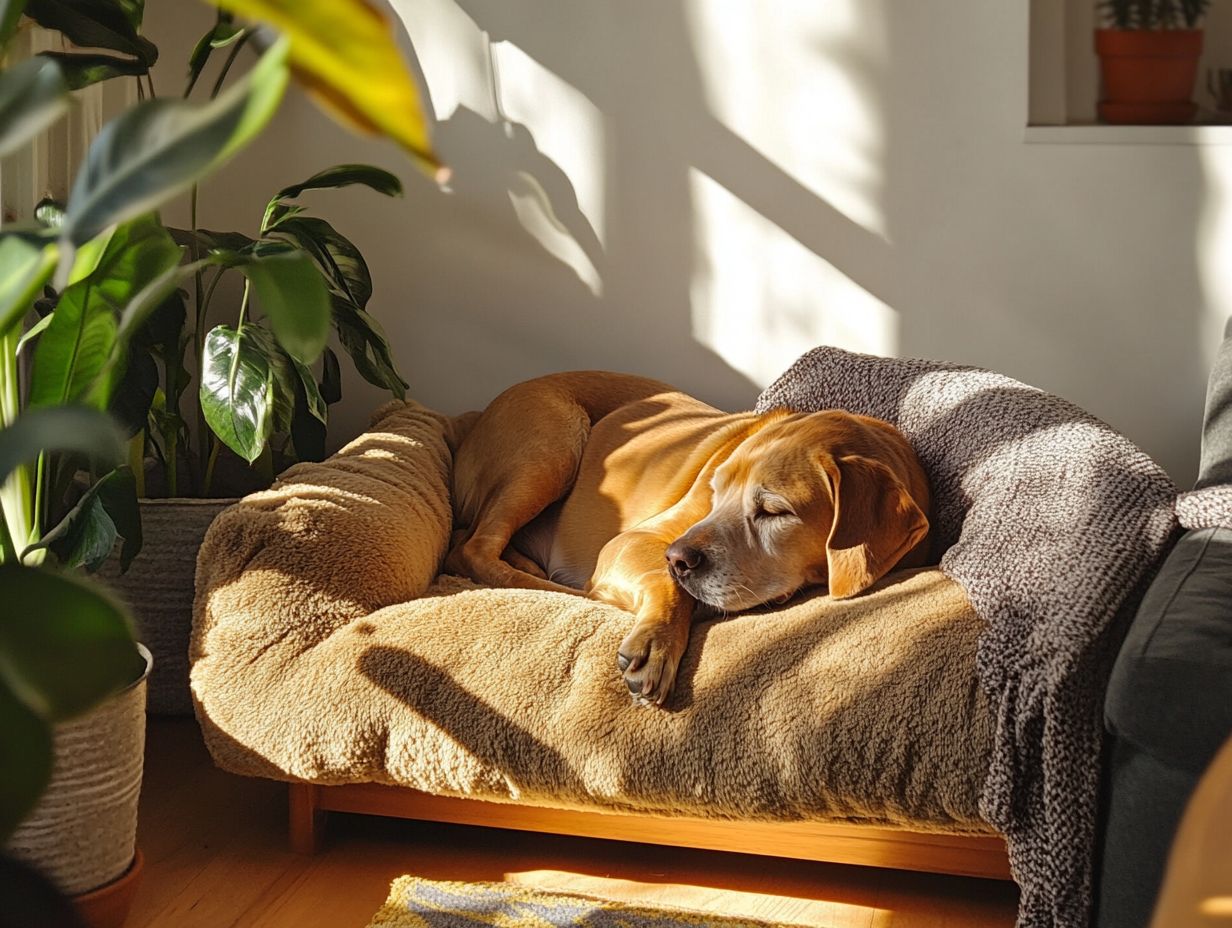
Creating safe and accessible spaces in your home helps prevent accidents. Use slip-resistant floors and area rugs to improve traction.
Implement safety measures like strategically placed area rugs for better grip. Also, install baby gates to restrict access to stairs or rooms that could be dangerous.
Regularly check these areas to keep them welcoming and comfortable, as outlined in safe spaces: how to design a pet retreat. This enhances the well-being of your cherished senior pets.
Providing Proper Nutrition and Hydration
Proper nutrition and hydration are essential for your senior dog’s health. Use senior pet nutrition formulas tailored to their needs.
These formulas help ensure they receive the right nutrients. Don’t forget regular vet visits to monitor their health!
Nutrition for Healthy Senior Pets
Dietary considerations for senior pets are crucial for managing health concerns and enhancing their quality of life. This is particularly important for arthritis support and joint health. Tailoring nutrition specifically for your aging dog helps with issues like obesity and arthritis, ensuring they receive appropriate comfort care.
As your pet enters their golden years, choose ingredients that promote energy and support joint health. This ultimately contributes to their overall wellness. Brands like Ultimate Pet Nutrition focus on high-quality protein sources and essential fatty acids. These can help maintain muscle mass and reduce inflammation, making them a great choice for senior dog care.
Veterinarians, including experts like Gary Richter from Schwarzman Animal Medical Center, suggest gradually transitioning to specialized diets. This ensures your dog s digestive system adapts seamlessly, resulting in improved comfort care. Adding antioxidants substances that fight cell damage and fiber boosts well-being, allowing senior dogs to thrive amidst their evolving needs.
Keep an eye on their weight and health to guide necessary adjustments. This includes using night lights and making environmental adaptations. Help your furry friend thrive and enjoy a vibrant life in their later years.
Ensuring Adequate Hydration
It s crucial that your senior dog stays hydrated for their overall health and quality of life. This can be achieved through thoughtful dog bowl designs. Hydration plays a vital role in bodily functions and can help prevent issues like kidney disease and urinary tract infections.
To make water more accessible, explore various dog bowl designs and consider elevated bowls. These can reduce strain on joints. Elevated bowls provide easier access for older pets facing mobility challenges, especially when combined with non-slip surfaces to prevent spills. Features like non-slip bases ensure a cleaner eating area, supporting pet hygiene and comfort.
It’s vital to monitor the hygiene of these bowls regularly. Standing water can attract bacteria that may compromise your pet s health. Regular vet visits and care for seniors are essential.
By promoting good hygiene practices, you can create a healthier drinking environment. Encourage your cherished companion to stay hydrated and thrive, essential for their overall wellness.
Managing Health and Medical Needs
Managing the health and medical needs of senior dogs is paramount. As they face age-related health concerns, regular vet visits for effective monitoring become essential. These visits allow for thorough monitoring of their well-being and adjustments to their care as needed.
These appointments enable you to update medication and treatment plans. Ensure your beloved companion receives effective comfort care throughout their golden years, including managing arthritis support and mobility issues.
Regular Check-Ups and Preventive Care
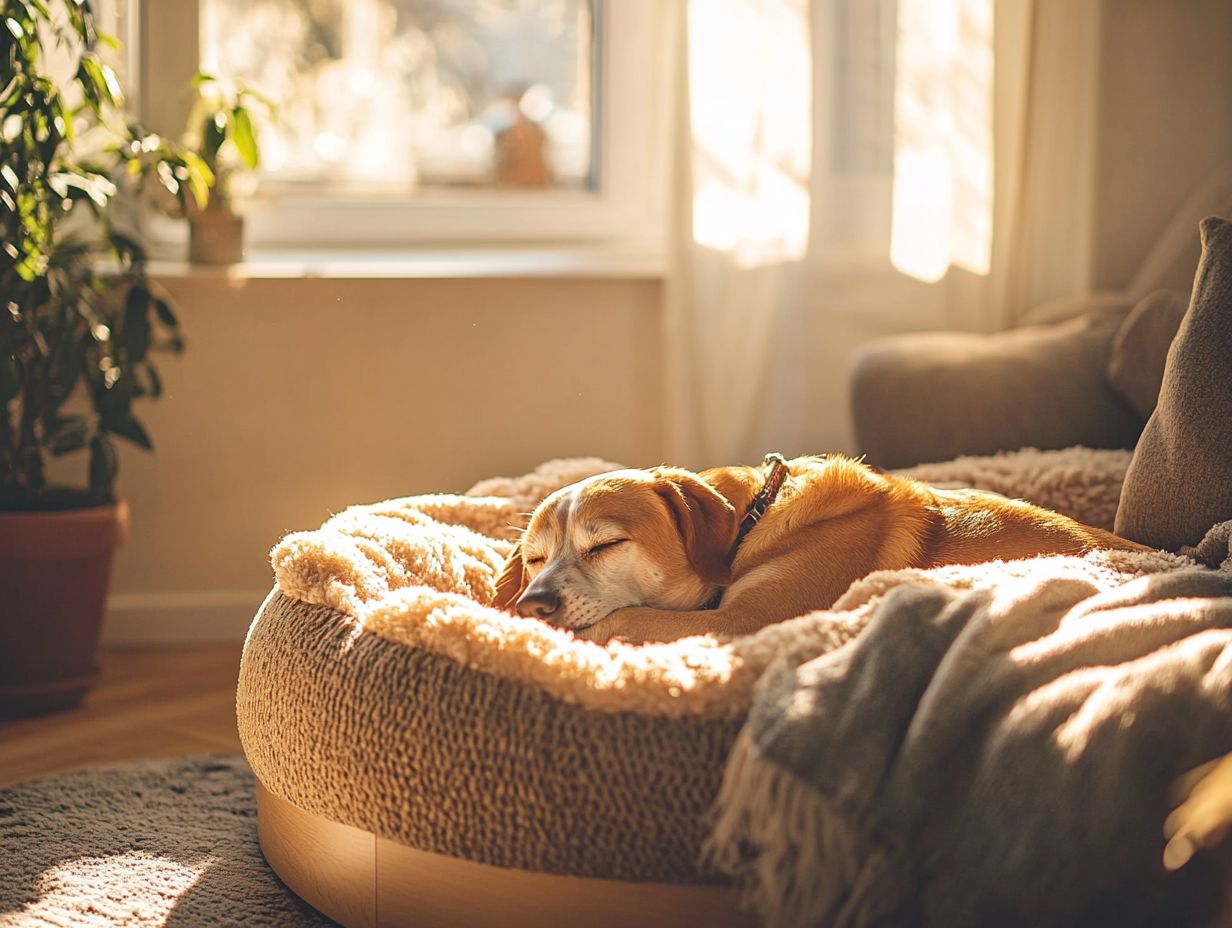
Regular check-ups and preventive care are essential for senior dogs. They enable you to catch health concerns early, especially by monitoring behavioral changes or decreased activity levels.
By adopting a proactive approach, incorporate vital vaccinations to protect against diseases along with routine dental examinations that help prevent painful oral health issues. Monitoring age-related health problems, such as arthritis or kidney disease, is easier with consistent veterinary visits. This is crucial for effective comfort care and injury prevention.
These appointments provide the perfect chance to discuss any behavioral changes or decreased activity levels. Ensure your pet receives appropriate care and adjustments to their routine, including suggestions for environmental adaptations to enhance their quality of life.
Ultimately, these preventive measures enhance your dog’s quality of life and longevity. Let your senior companion fully enjoy their golden years with happiness and vitality, supported by thoughtful pet accessories. Talk to your vet about the best diet for your senior dog today!
Medication and Treatment Plans
Creating effective medication and treatment plans for senior dogs is crucial. It helps manage their health concerns and ensures they receive optimal comfort care as they age.
As your dog grows older, they might face health issues like arthritis, heart disease, and cognitive decline. Different medications may be needed, such as anti-inflammatory drugs or supplements like glucosamine.
Each treatment plan must be tailored to your dog’s unique needs. Factors like breed, weight, and overall health heavily influence medication choices and dosages.
Don’t forget the importance of regular veterinary check-ups! These visits help monitor your dog’s progress and allow for necessary adjustments to their treatment, ultimately ensuring a higher quality of life.
Emotional Support and Enrichment
Emotional support and enrichment are vital for your senior dog’s well-being. They significantly influence your dog’s happiness and comfort.
Provide mental stimulation through engaging activities. This can combat cognitive decline and enhance companionship.
Importance of Mental Stimulation
Mental stimulation is crucial for your senior dog. It helps slow cognitive decline and boosts emotional well-being.
Activities like puzzle toys challenge your dog’s problem-solving skills. Training exercises focusing on obedience and agility keep their minds active and strengthen your bond.
Regular play and training are essential! An engaged dog is less likely to experience anxiety or depression.
Ways to Provide Comfort and Companionship
Providing comfort and companionship is crucial for your senior dog’s emotional health. Regular cuddling strengthens your bond and makes them feel secure.
Spend quality time together doing activities they love like leisurely walks or relaxing on the couch. A stable routine helps reduce anxiety, letting them feel more at ease.
Be attentive to their emotional needs. Recognizing signs of stress or discomfort ensures they have a safe and loving environment, which is essential for their tranquility and joy.
Frequently Asked Questions
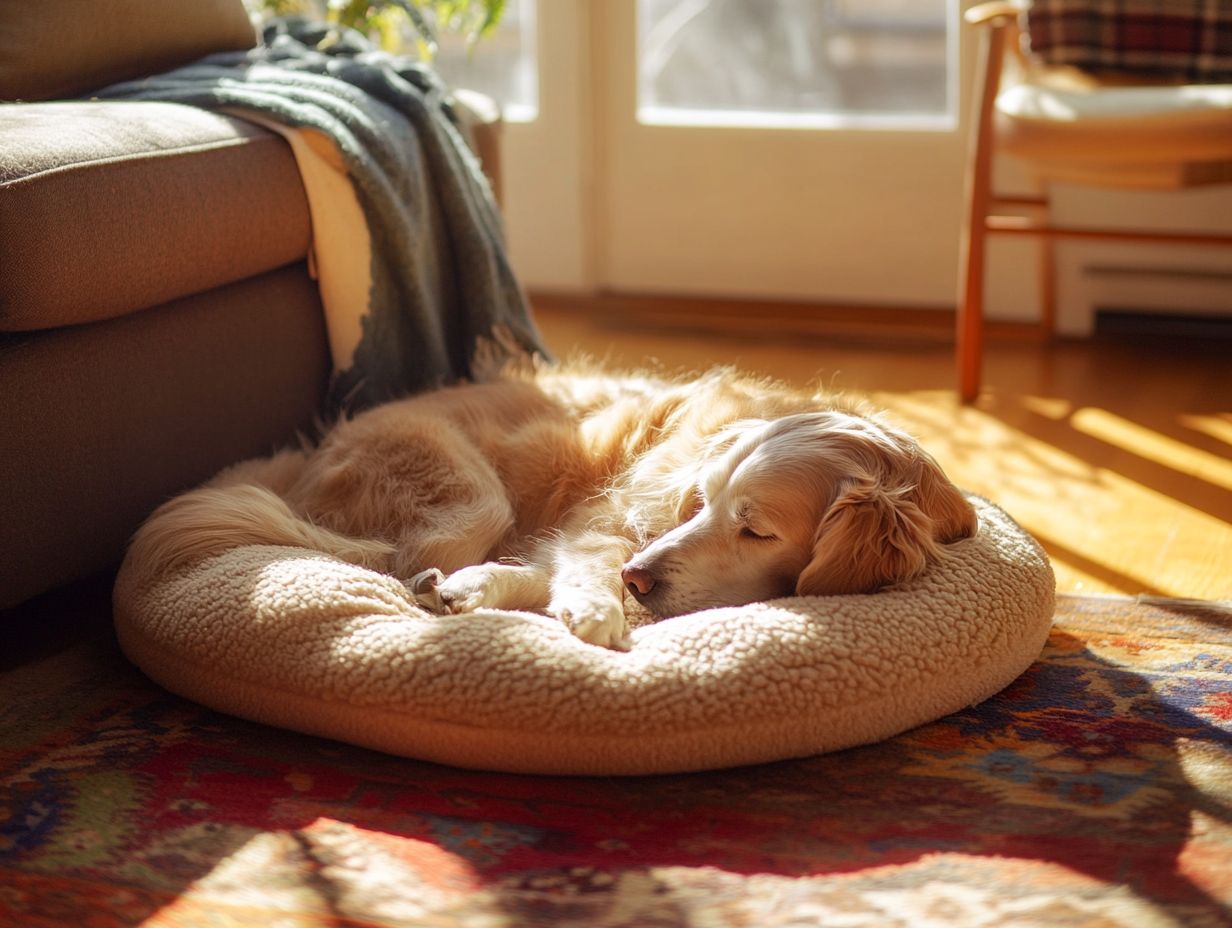
How can I create a comfortable space for my senior pet?
Make your senior pet’s space cozy, quiet, and easily accessible. Consider adding comfort items in pet spaces like a soft, warm bed in a calm area, which is ideal.
Consider ramps or steps so they can reach their bed, food, and water easily.
What type of bedding is best for senior pets?
Choose bedding that is soft and supportive. Memory foam or orthopedic beds are excellent options as they provide extra cushioning for aching joints.
Avoid beds with high sides or raised edges, as they may be difficult for your pet to climb in and out of.
How can I make my home more comfortable for my senior pet?
Add rugs or carpeting to slippery floors to help your pet maintain their footing.
Keep the temperature in your home comfortable, as older pets can be more sensitive to extreme temperatures. Additionally, consider creating a low-stimulation environment for pets to further enhance their comfort.
What kind of toys are suitable for senior pets?
Senior pets often have less energy and mobility. Choose toys that are gentle on their bodies, like soft toys, puzzle toys, or treat-dispensing toys.
Avoid toys that require too much running or jumping.
Should I make any changes to my senior pet’s diet?
As pets grow older, their nutritional needs change. Consult your veterinarian to see if you need to adjust your senior pet’s diet.
Your vet may suggest a special diet or supplements for joint health and mobility.
What else can I do to ensure my senior pet is comfortable in their space?
Creating a cozy environment is essential. Regular grooming and veterinary care are also important, like keeping nails trimmed and scheduling check-ups.
Show your senior pet love and attention to ensure they feel happy and comfortable.

